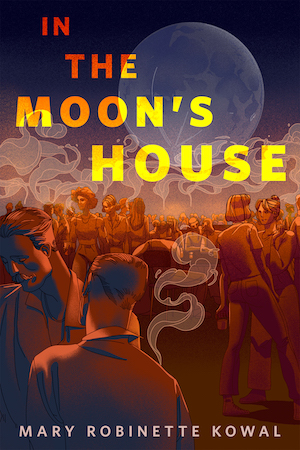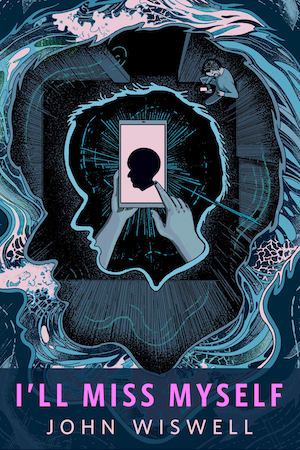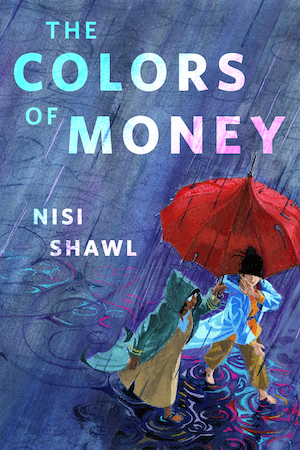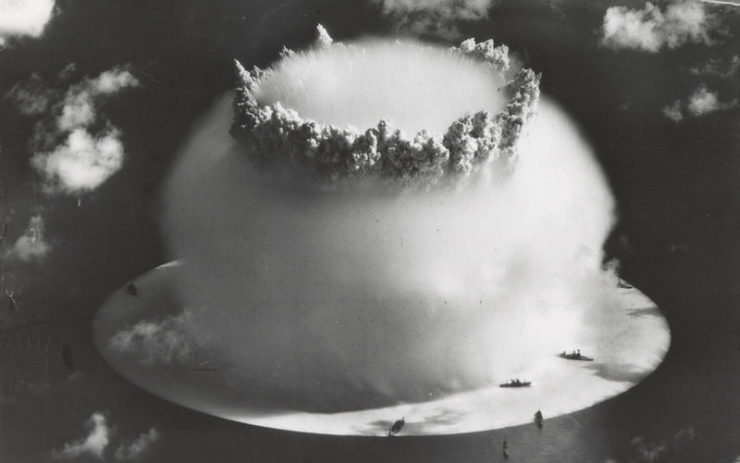When I look back on it, it was quite quite odd that so many of us, back in the benighted 20th century, accepted the threat of nuclear war (thousands of nuclear weapons perpetually poised for launch) as normal. Just part of the background noise for daily life. Anyone who expressed concern about living on the knife edge of catastrophe was probably either some sort of political extremist or some sort of unhinged commie sex pervert.
But…even if all-out nuclear war were impossible, nuclear blackmail wasn’t. Some nation, NGO, or highly motivated individual could build bombs and threaten to use them if they didn’t get what they wanted. (Nice planet you have here; shame if anything happened to it…) At one time there was a fair bit of worry that this would happen; then (at least as far I can tell using Google Ngram) people sank into numb acceptance that there was nothing they could do to avoid doom. (Am I wrong here? You oldbies can tell me about it in comments.)
One work that sounded the alarm was John McPhee’s The Curve of Binding Energy (a 1973 New Yorker article and later a book) which painted the issue as an imminent threat. Nuclear materials were shoddily managed, the article claimed. Ted Taylor, the bomb expert on whose testimony the book relied, argued that knowledge like his was all too easy to acquire and misuse.
Fiction authors were not slow to realize the dramatic potential of nuclear blackmail. Consider these five examples.
The Mouse that Roared by Leonard Wibberley (1955)
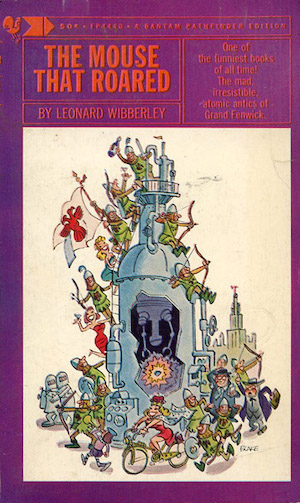
The tiny principality of Grand Fenwick had no intention of blackmailing the world with atomic doom. Faced with economic calamity (Americans had successfully copied Grand Fenwick’s principal export, Pinot Grand Fenwick wine), they came up with a simple but brilliant plan: declare war on the United States of America, lose, capitulate, and then wait for US to expend billions of dollars rebuilding Grand Fenwick (shades of the Marshall Plan). Since Grand Fenwick had not upgraded its military toolkit since the Hundred Years War, there was no way this cunning scheme could go wrong. Or so it seemed.
The handful of men-at-arms dispatched to New York City find a city abandoned thanks to a Cold War-era Civil Defense exercise. Hunting for someone to whom they might surrender, they stumble across Dr. Kokintz and his Q-bomb demonstration model. Both Kokintz and his device are carried off to Grand Fenwick, whereupon the astounded Grand Fenwickians discover to their alarm that they are now in possession of a weapon that could, if detonated, depopulate a continent. Still, having the eyes of the world on them has possibilities…provided nobody jostles the delicate Q-bomb.
***
Ecotopia by Ernest Callenbach (1975)

Twenty years after the West Coast exited the United States of America to form a utopian ecotopian state, ace reporter Will Weston travels to Ecotopia. Officially, his purpose is report on conditions in the breakaway nation. Unofficially, the US President wants the reporter to feel out the possibility of Ecotopia being reabsorbed into the Union. Not only are true Ecotopians utterly disinterested in rejoining capitalist, ecologically deranged America, they waste little time assimilating the reporter into the Ecotopian way of life.
Ecotopia’s independence is based in part on the simple fact that a few highly motivated militias can easily handle the much larger, better funded, but inefficient American military-industrial complex. Elan trumps mere logistics, after all. Another, perhaps more important element in the Ecotopian defense strategy is that they may or may not have mined American cities with nuclear devices. Thus far, the US has not cared to test this.
***
Alongside Night by J. Neil Schulman (1979)
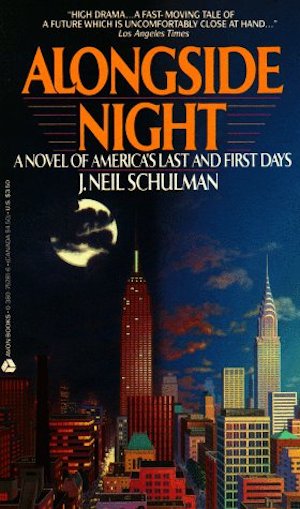
Thirty years of fiat currency and rampant short-sighted nanny-statism have left the United States of 2001 in a parlous state: annual inflation is 2000 percent per year and coffee costs $500.00 a cup. The state’s reaction to unrest is to double down on economic mismanagement while brutally suppressing malcontents and dissidents. This march towards a permanent state of emergency, martial law, and unending oppression turns out to be the opportunity the libertarian Revolutionary Agorist Cadre needs to stage a bold takeover. America will be saved to follow the one true gold-standard-based way!
Political chaos might provide America’s rivals and enemies with the opportunity to interfere in American affairs. The RAC has a fix for this: they covertly mine a number of foreign cities with nuclear devices before providing proof that they did so. The fear that the US will detonate as yet hidden mines in the event of interference is enough to deter rascally foreign governments. While it’s not clear why secretly mining cities is better than simply aiming ICBMs at those cities, the stratagem proves effective.
***
Special Bulletin (TV movie), written by Edward Zwick and Marshall Herskovitz (1983)
Disillusioned nuclear weapons experts Dr. Bruce Lyman, Dr. McKeeson, and their fellow peacenik terrorists are determined to put an end to nuclear escalation before it leads to nuclear war. To this end, they turn the military-industrial complex’s tools against it. McKeeson constructs a small nuclear device, which they sneak into Charleston on a boat. When the Coast Guard attempts to intervene, the terrorists take hostage a group of reporters who just happened to be standing on the docks to report on unrelated labour unrest.
The reporters provide Lyman with the perfect channel through which to deliver his ultimatum: the US must turn over all of the nuclear trigger devices from the Charleston’s naval base or the terrorists will detonate their device. This ensures the full attention of the viewing public and its government. The official response to Lyman’s flung gauntlet will be very public and extremely memorable.
***
The Takeover by C.G. Edmondson and C. M. Kotlan (1984)
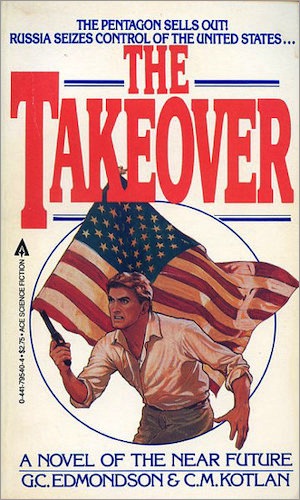
First: The Soviets trigger an energy crisis by bribing Canada and Mexico to halt oil sales to the US.
Second: The Reds detonate a small nuclear device in a troubled Caribbean nation.
Third: Those darn commies dispatch a pair of terminally-ill diplomats to meet with US President Cannon. Several American cities, including the one in which Cannon stands, have been seeded with concealed atom bombs. Cannon has a choice: incineration or host Soviet advisors to “assist” with dismantling the supposed rampant nuclear terrorism threat. Cannon capitulates to a degree even Soviet optimists could never have predicted. America has fallen!
Except…Admiral Conyers has fled out to sea with a small fleet of Trident subs before the Soviets could completely lock down the USA. If the Reds destroy a dozen American cities, Conyers can depopulate the Northern Hemisphere. The Soviets seek some means to compel Conyers’ surrender. Thanks to a series of improbable coincidences, one illegal immigrant named Mariano stands between America and final defeat…and the bigoted Americans have never given Mariano reason to love the USA.
***
Although concern re: nuclear blackmail seems to have faded with the end of the Cold War, perhaps I am overlooking some modern examples. Perhaps asking for memories jogs will prove a mere bagatelle…but I have faith in the collective memories of the legions of Tor.com readers. Comments are below.
In the words of Wikipedia editor TexasAndroid, prolific book reviewer and perennial Darwin Award nominee James Davis Nicoll is of “questionable notability.” His work has appeared in Publishers Weekly and Romantic Times as well as on his own websites, James Nicoll Reviews and Young People Read Old SFF(where he is assisted by editor Karen Lofstrom and web person Adrienne L. Travis). He is a four-time finalist for the Best Fan Writer Hugo Award and is surprisingly flammable.



